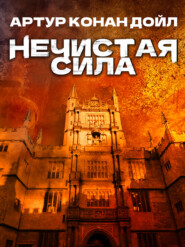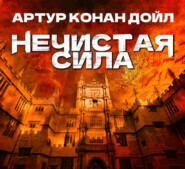По всем вопросам обращайтесь на: info@litportal.ru
(©) 2003-2025.
✖
Round the Fire Stories
Настройки чтения
Размер шрифта
Высота строк
Поля
“Assez! assez!” cried the little French priest, raising his hand in protest. He had been twenty years in China. The professor had said nothing, but there was something, some lurking horror, in his dull, grey eyes which had turned the ladies pale.
“I am sorry,” said the missionary. “I can see that it is a painful subject. I should not have asked.”
“No,” the Professor answered, slowly. “It is wiser not to ask. It is better not to speak about such things at all. But surely those guns are very much nearer?”
There could be no doubt of it. After a silence the thud-thud had recommenced with a lively ripple of rifle-fire playing all round that deep bass master-note. It must be just at the farther side of the nearest hill. They pushed back their chairs and ran out to the ramparts. The silent-footed native servants came in and cleared the scanty remains from the table. But after they had left, the old Professor sat on there, his massive, grey-crowned head leaning upon his hands and the same pensive look of horror in his eyes. Some ghosts may be laid for years, but when they do rise it is not so easy to drive them back to their slumbers. The guns had ceased outside, but he had not observed it, lost as he was in the one supreme and terrible memory of his life.
His thoughts were interrupted at last by the entrance of the Commandant. There was a complacent smile upon his broad German face.
“The Kaiser will be pleased,” said he, rubbing his hands. “Yes, certainly it should mean a decoration. ‘Defence of Ichau against the Boxers by Colonel Dresler, late Major of the 114th Hanoverian Infantry. Splendid resistance of small garrison against overwhelming odds.’ It will certainly appear in the Berlin papers.”
“Then you think we are saved?” said the old man, with neither emotion nor exultation in his voice.
The Colonel smiled.
“Why, Professor,” said he, “I have seen you more excited on the morning when you brought back Lepidus Mercerensis in your collecting-box.”
“The fly was safe in my collecting-box first,” the entomologist answered. “I have seen so many strange turns of Fate in my long life that I do not grieve nor do I rejoice until I know that I have cause. But tell me the news.”
“Well,” said the Colonel, lighting his long pipe, and stretching his gaitered legs in the bamboo chair, “I’ll stake my military reputation that all is well. They are advancing swiftly, the firing has died down to show that resistance is at an end, and within an hour we’ll see them over the brow. Ainslie is to fire his gun three times from the church tower as a signal, and then we shall make a little sally on our own account.”
“And you are waiting for this signal?”
“Yes, we are waiting for Ainslie’s shots. I thought I would spend the time with you, for I had something to ask you.”
“What was it?”
“Well, you remember your talk about the other siege – the siege of Sung-tong. It interests me very much from a professional point of view. Now that the ladies and civilians are gone you will have no objection to discussing it.”
“It is not a pleasant subject.”
“No, I dare say not. Mein Gott! it was indeed a tragedy. But you have seen how I have conducted the defence here. Was it wise? Was it good? Was it worthy of the traditions of the German army?”
“I think you could have done no more.”
“Thank you. But this other place, was it as ably defended? To me a comparison of this sort is very interesting. Could it have been saved?”
“No; everything possible was done – save only one thing.”
“Ah! there was one omission. What was it?”
“No one – above all, no woman – should have been allowed to fall alive into the hands of the Chinese.”
The Colonel held out his broad red hand and enfolded the long, white, nervous fingers of the Professor.
“You are right – a thousand times right. But do not think that this has escaped my thoughts. For myself I would die fighting, so would Ralston, so would Ainslie. I have talked to them, and it is settled. But the others, I have spoken with them, but what are you to do? There are the priest, and the missionary, and the women.”
“Would they wish to be taken alive?”
“They would not promise to take steps to prevent it. They would not lay hands on their own lives. Their consciences would not permit it. Of course, it is all over now, and we need not speak of such dreadful things. But what would you have done in my place?”
“Kill them.”
“Mein Gott! You would murder them?”
“In mercy I would kill them. Man, I have been through it. I have seen the death of the hot eggs; I have seen the death of the boiling kettle; I have seen the women – my God! I wonder that I have ever slept sound again.” His usually impassive face was working and quivering with the agony of the remembrance. “I was strapped to a stake with thorns in my eyelids to keep them open, and my grief at their torture was a less thing than my self-reproach when I thought that I could with one tube of tasteless tablets have snatched them at the last instant from the hands of their tormentors. Murder! I am ready to stand at the Divine bar and answer for a thousand murders such as that! Sin! Why, it is such an act as might well cleanse the stain of real sin from the soul. But if, knowing what I do, I should have failed this second time to do it, then, by Heaven! there is no hell deep enough or hot enough to receive my guilty craven spirit.”
The Colonel rose, and again his hand clasped that of the Professor.
“You speak sense,” said he. “You are a brave, strong man, who know your own mind. Yes, by the Lord! you would have been my great help had things gone the other way. I have often thought and wondered in the dark, early hours of the morning, but I did not know how to do it. But we should have heard Ainslie’s shots before now; I will go and see.”
Again the old scientist sat alone with his thoughts. Finally, as neither the guns of the relieving force nor yet the signal of their approach sounded upon his ears, he rose, and was about to go himself upon the ramparts to make inquiry when the door flew open, and Colonel Dresler staggered into the room. His face was of a ghastly yellow-white, and his chest heaved like that of a man exhausted with running. There was brandy on the side-table, and he gulped down a glassful. Then he dropped heavily into a chair.
“Well,” said the Professor, coldly, “they are not coming?”
“No, they cannot come.”
There was silence for a minute or more, the two men staring blankly at each other.
“Do they all know?”
“No one knows but me.”
“How did you learn?”
“I was at the wall near the postern gate – the little wooden gate that opens on the rose garden. I saw something crawling among the bushes. There was a knocking at the door. I opened it. It was a Christian Tartar, badly cut about with swords. He had come from the battle. Commodore Wyndham, the Englishman, had sent him. The relieving force had been checked. They had shot away most of their ammunition. They had entrenched themselves and sent back to the ships for more. Three days must pass before they could come. That was all. Mein Gott! it was enough.”
The Professor bent his shaggy grey brows.
“Where is the man?” he asked.
“He is dead. He died of loss of blood. His body lies at the postern gate.”
“And no one saw him?”
“Not to speak to.”
“Oh! they did see him, then?”
“Ainslie must have seen him from the church tower. He must know that I have had tidings. He will want to know what they are. If I tell him they must all know.”
“How long can we hold out?”
“An hour or two at the most.”
“Is that absolutely certain?”
“I pledge my credit as a soldier upon it.”

















